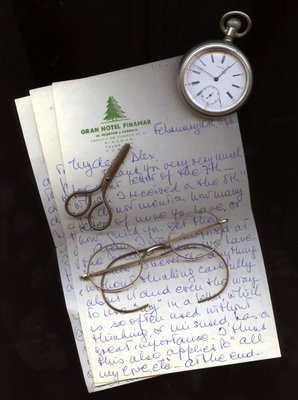Gandhi & Hitler - Goodness & Evil In My Memory
Saturday, March 07, 2009

Seeing the lovely evocative still life pictures, in the newspapers, containing some of Mahatma Gandhi’s personal items that went up for auction this past week reinforced my concern about my wife telling me a few weeks ago that, “I was no longer for this world,” as I thought too much about the past. Rosemary increasingly feels that I don’t fit much in my present. Jokingly asking Hilary, my youngest daughter (at the dinner table) last Monday if she could obtain a large bottle of sleeping pills for me was not taken as a joke and I was received with ice-cold silence. Even Rebecca (Hilary's daughter) caught on.
The pictures of Gandhi, his pocket watch and glasses made me think of my past, of my wife Rosemary and of my mother. In that hazy era of my life in the late 40s when I was under 10 my mother had introduced me to evil when she had noted that when my hair fell over my eyes I looked like Hitler. “Who is Hitler?" I had asked. “He was an evil man," she answered. And I first heard of goodness from her, too. Often when I misbehaved she would tell me that I should try to be good like Mahatma Gandhi. I have visions of b+w newsreels showing the British leaving India. As soon as the Indians opened their embassy in Buenos Aires my father did translation work for them. He even had the audacity to invite some of his Indian friends home to sample his curry.
During the middle ages and the renaissance, painters and sculptors worked on commission. Their portraits and sculptures were for wealthy patrons or purchased to decorate the churches of a wealthy Catholic church. It is only with war that these paintings and sculptures changed hands. Napoleon looted the treasures of Venice and Egypt, the Spaniards looted the Lower Countries and the works of art then changed hands from the Spanish kings to the Prado Museum. The British expropriated the treasures of Greece and other parts of their far flung empire. The idea of seeing a work of art on a gallery wall is a relatively modern phenomenon. The few paintings that remained in private hands (after museums secured most of them) have changed hands in the latter part of the 20th century and in the beginning of this one for huge sums of money. When paintings just about disappeared, auction houses “discovered” the works of photographers and as an example, the photographs of American Edward Steichen. One of his prints sold for millions recently. With so many rich people in the world, exclusivity and power are the only ways to rise from wealthy anonymity. With few paintings, sculptures and exotic cars like Duisenbergs left, people with money now achieve exclusivity by collecting fame or infamy. Fame, Gandhi’s glasses, infamy a Hitler watercolour. O.J. Simpson’s white Ford Bronco will surely be snapped up for lots of money in a not-so-distant future.
This trend to collect the trappings of fame is no different from the medieval one to secure the bodies or parts thereof saints. The Venetians in 828 ‘kidnapped” St. Matthew’s body from under the eyes of Egyptians in Alexandria.
The trend to search for fame has brought us all those homes and hotels with signs that say, “Martha Washington slept here,” “Alexander von Humboldt wrote here," "Oscar Wilde was caught in the act of ...here," and the like.
Our memory for history is certainly longer than for the history of our own lives. In the early 70s Rosemary asked my mother to write (with a white pen) the names of her relatives and my father’s with dates in our photo album. Death to me has always been staring at me from the pages of my family album. If some of those faces have not been identified by my mother I do not know who they are. Therefore they are finally dead. They are dead in the vacuum of my memory. I expect my picture to stare back at some descendant of mine in a near future (two generations is all it takes) who will stare and draw a blank.
In the still life here I have placed on my scanner a letter I received from my girlfriend Susy in February 1966 who was vacationing in the resort town of Pinamar. We got to know each other through these letters and finally managed to get a weekend at the Naval Ministry off and I hitchhiked to Pinamar where we met on the beach. So romantic, so long ago it was. Susy is dead and I have a few of her letters and some memories. Would anybody care to read the letters now? I don’t think so. Will Rebecca and Lauren find them fascinating when they are older? I doubt it. Should I keep them? I do, because I don’t have the heart to throw them away or to burn them. The little scissors and the gold eyeglasses belonged to Rosemary's grandmother. The Longines watch I won at cards in the late 60s. They have an intrinsic value to Rosmary and to me, now.
Ultimately the difference between ordinary mortals and celebrities like Gandhi is time. Time in the end brings us all an oblivion we all democratically share. Meanwhile as we get older and we are surrounded by all these objects of our past, parting with them is an anguish almost too terrible to bear.






